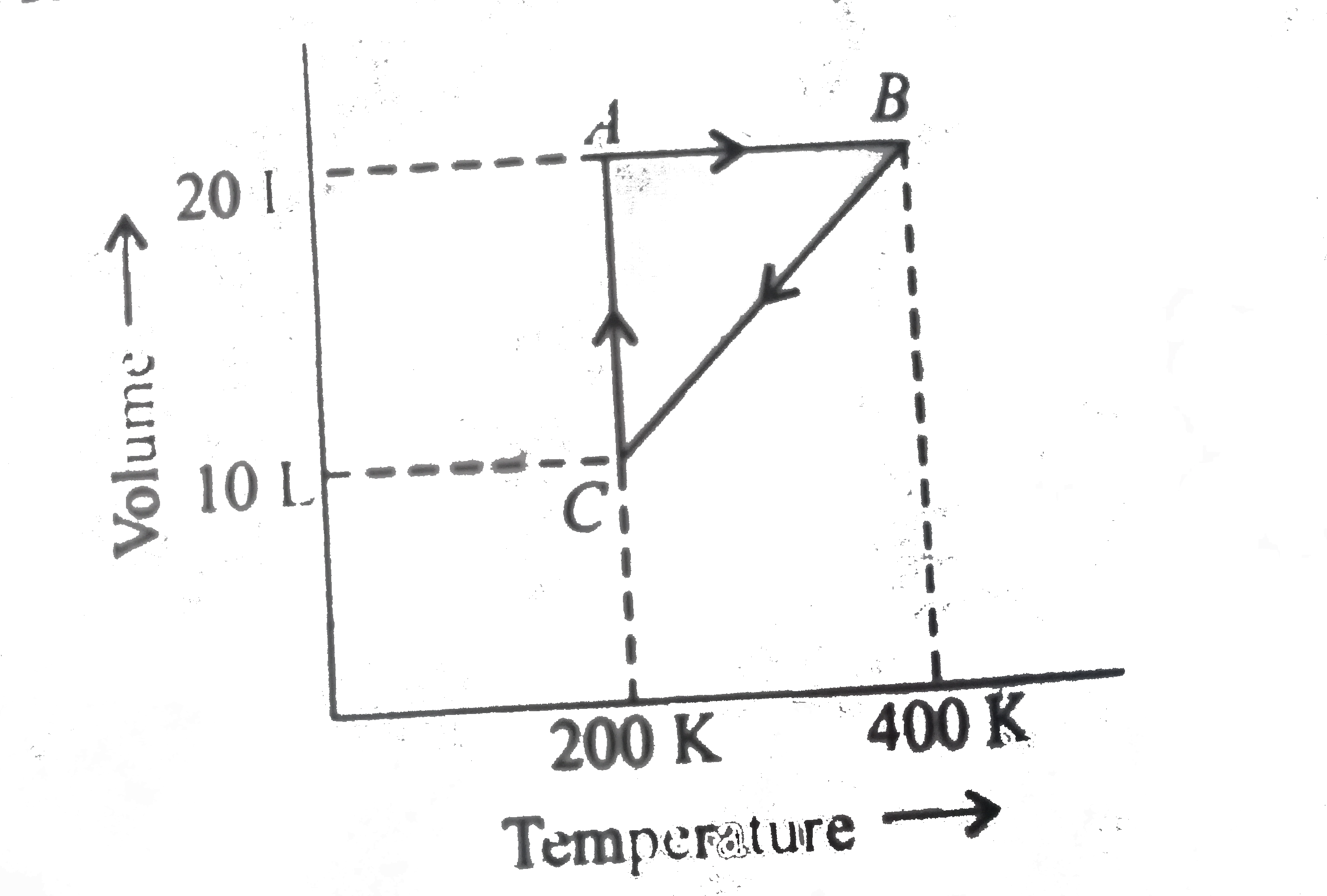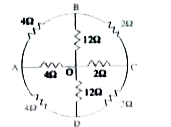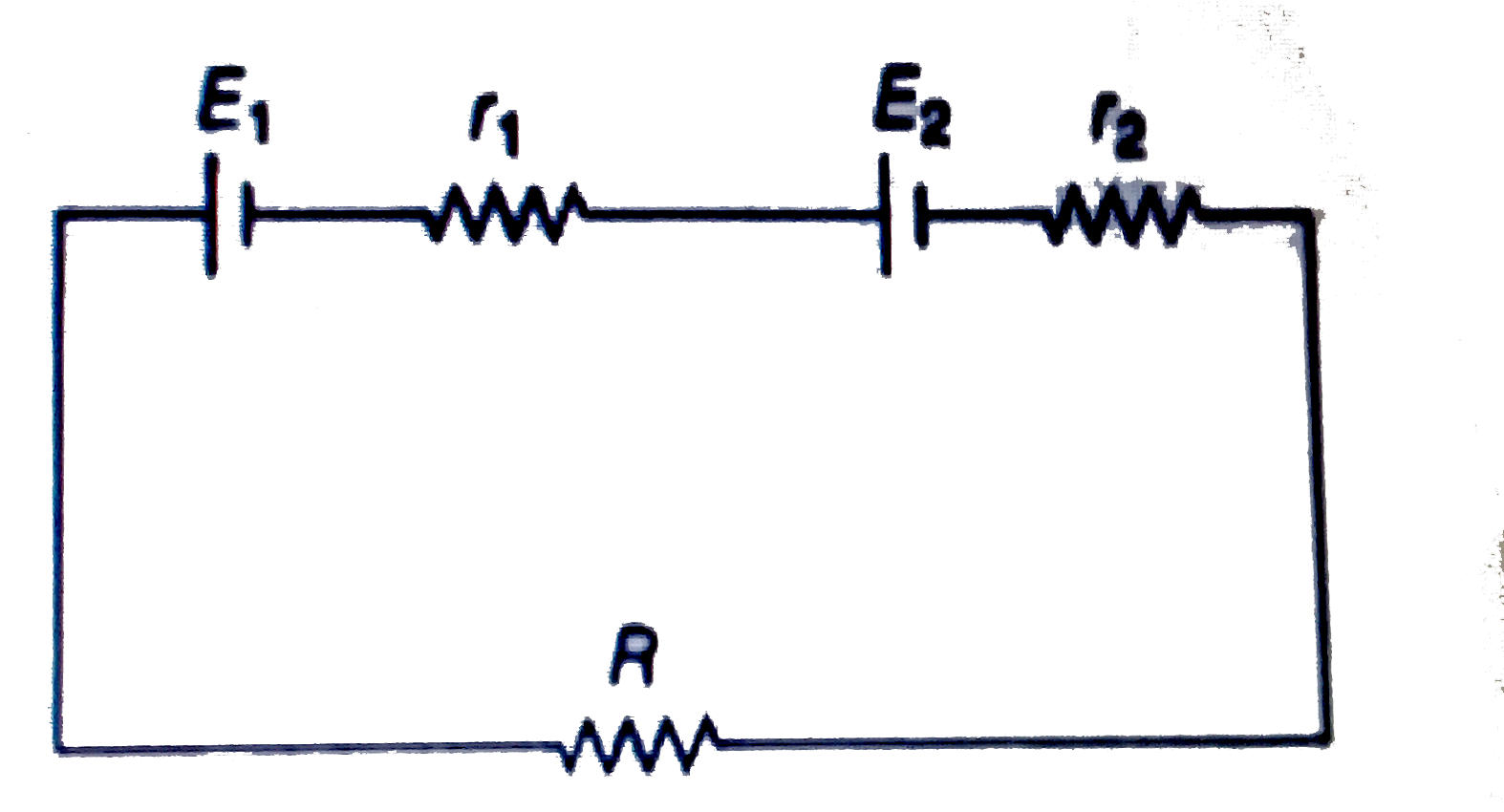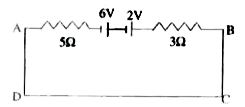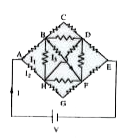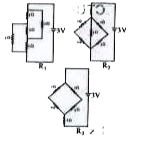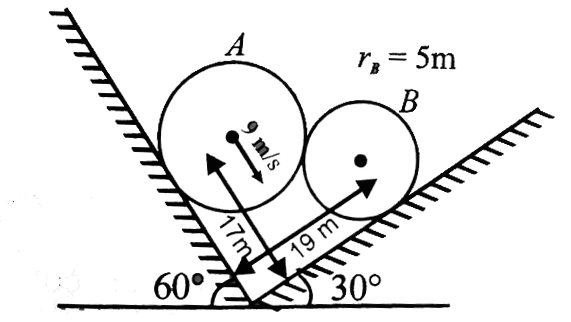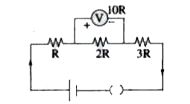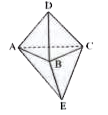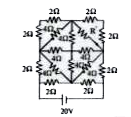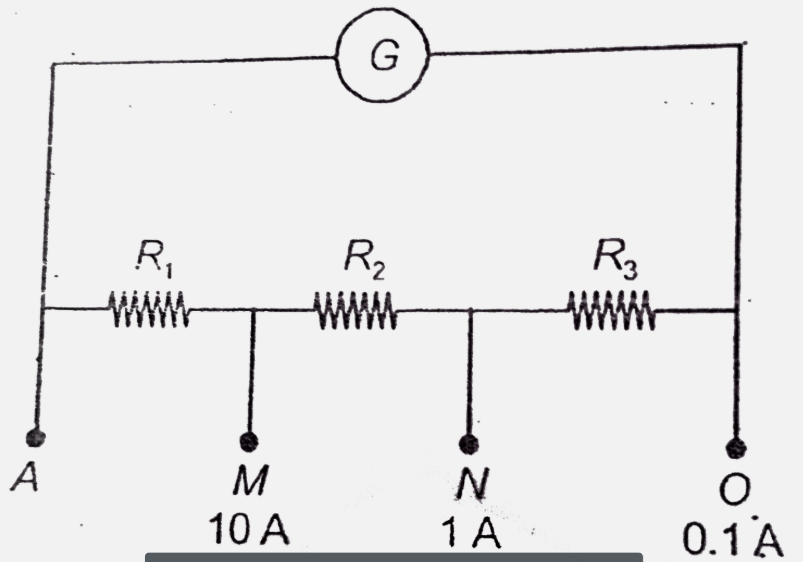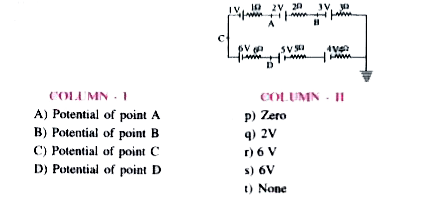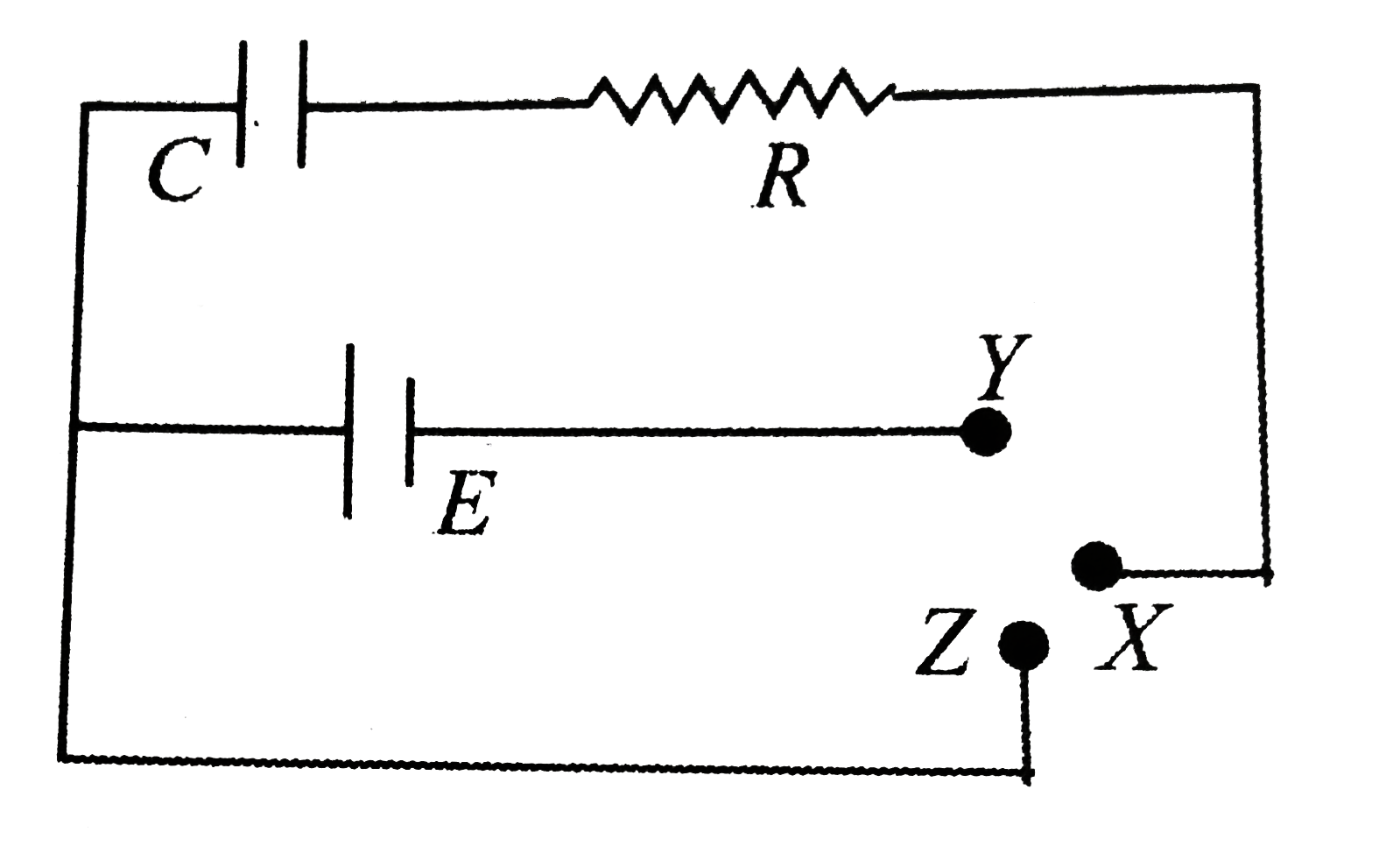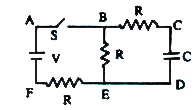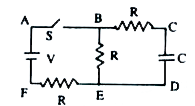ADDITIONAL PRACTICE EXERCISE (LEVEL -II LECTURE SHEET (ADVANCED) (Matrix Matching Type Questions)) from AAKASH SERIES CURRENT ELECTRICITY for Class 12
| Class 12 | PHYSICS |
| Chapter | CURRENT ELECTRICITY |
| AAKASH SERIES | ADDITIONAL PRACTICE EXERCISE (LEVEL -II LECTURE SHEET (ADVANCED) (Matrix Matching Type Questions)) |
| Medium | English |
| Academic Year | 2023-2024 |
Question 2
The space between the plates of a parallel plate capacitor is completely filled with a material of resistivity 2×1011Ωm and dielectric constant 6. Capacity of the capacitor with the given dielectric medium between the plates is 20μF. Find the leakage current if a potential difference 2500V is applied across the capacitor.View SolutionQuestion 18
Two motor boats A and B move from same point along a circle of radius 10 m in still water. The boats are so designed that they can move only with constant speeds. The boats A and B take 16 and 8 sec respectively to complete one circle in stationary water. Now water starts flowing at t=0 with a speed 4ms in a fixed direction. Find the distance between the boats after t=8 sec.View SolutionQuestion 21
A n-type silicon sample of width 4×10−3m, thickness 25×10−5m and length 6×10−2m carries a current of 4.8 mA when the voltage is applied across the length of the sample. If the free electron density is 1022m−3, then find how much time does it take for the electrons to travel the full length of the sample? Given that charge on an electron e=1.6×10−19C View SolutionQuestion 23
A long round conductor of cross-sectional area S is made of material whose resistivity depends only on a distance r from the axis of the conductor as ρ=α/r2, where α is a constant. Find the total resistance per unit length of the rod when potential difference is applied across its length. View SolutionQuestion 25
The circuit diagram shwon in the fig consist of a large number of elementws (each element has two resistors R1andR2. The resistance of the resistors in each subsequent element differs by a factor of k=12 from the resistance of the resistors in previous elements find the equivalent resistance between A and B shown in
 View Solution
View SolutionQuestion 30
Three bulbs A, B and C having rated power PA,PBandPC, respectively. Each bulb is designed to operate at rated voltage of V volts. It is given that PA>PB>PC. In columnI, different configurtaions of bubls are given while in ColumnII, intensities are mentioned. Match entires of ColumnI with entries of ColumnII, neglecting the change of resistances of bulbs due to temperature change.
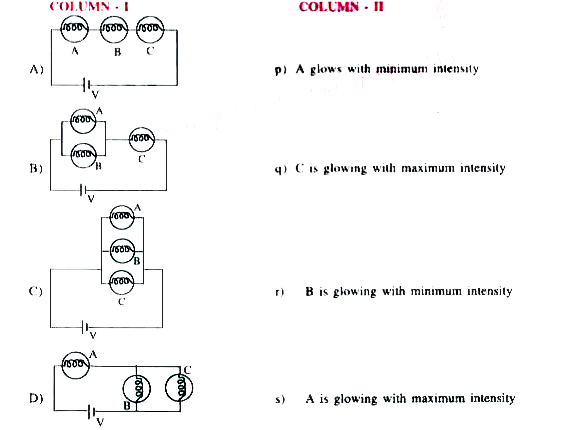 View Solution
View SolutionQuestion 38
A galvanometer having a resistance of 50Ω, gives a full scale deflection for a current of 0.05A. The length in metre of a resistance wire of area of cross - section 2.97×10−2cm2 that can be used to convert the galvanometer into an ammeter which can read a maximum of 5A current is (Specific resistance wire =5×10−7Ω−m) View SolutionQuestion 39
In the arrangement shows in fig. , when the switch S2 is open, the galvanometer shows no deflection for l=L/2. When the switch S2 is closed, the galvanometer shows no deflection for l=5/12L. The internal resistance (r) of 6 V cell and the emf E of the other battery are, respectively
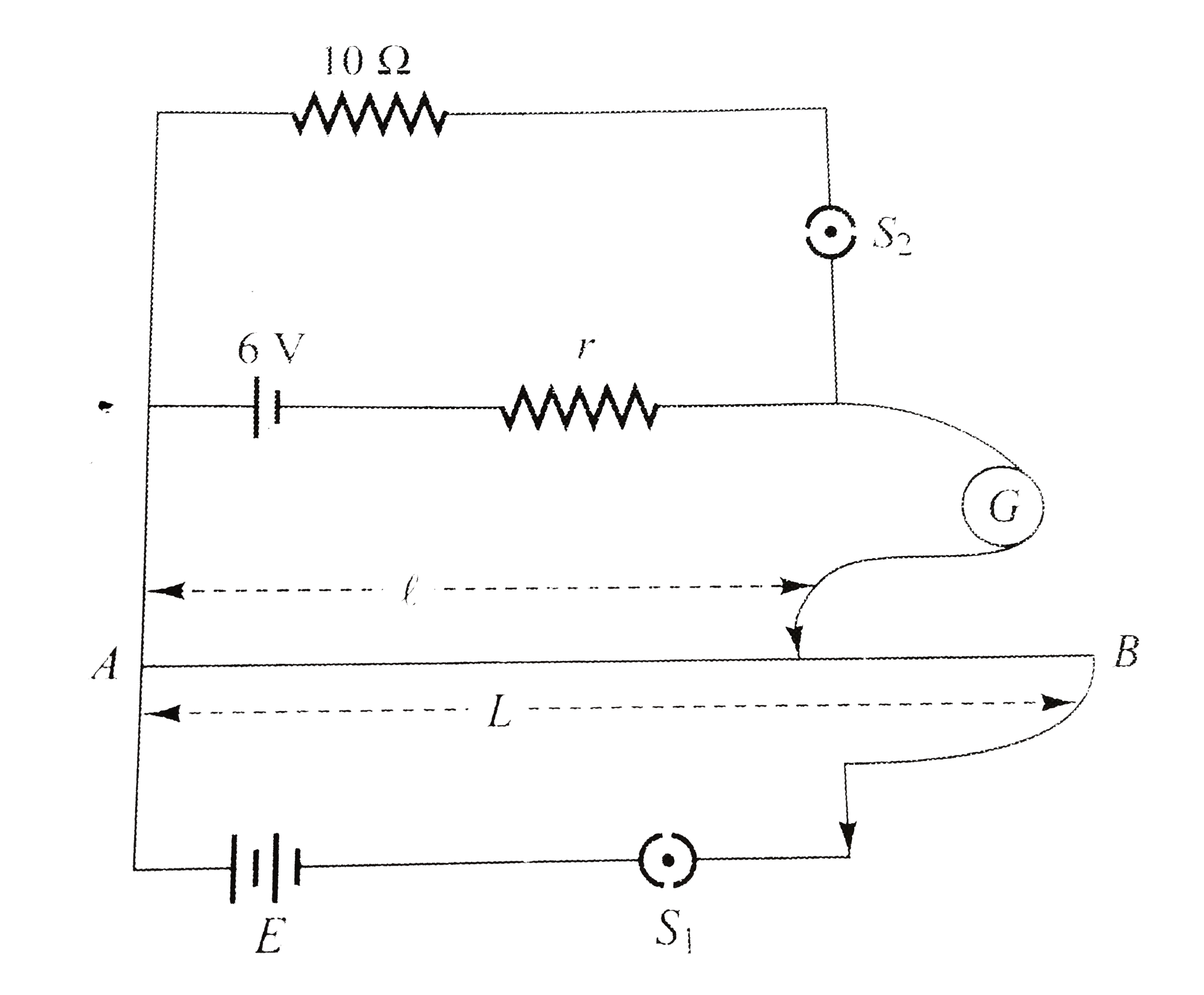 View Solution
View SolutionQuestion 42
A block of metal is heated directly by dissipating power in the internal resistance of block. Because of temperature rise, the resistance increases exponentially with time and is given by R(t)=0.5e2t, where t is in seconds. The block is connected across a 110 V source and dissipates 7644 J heat over a certain period of time. Calculate this period of time. View SolutionQuestion 43
A conductor has a temperature independent resistance R and a total heat capacity C. At the moment t=0 it is connected to a DC voltage V. Find the times dependence of the conductors temperature t assuming the thermal power dissipated into surrounding space to vary as q=k(T−T0) where k is a constant T0 is the surrounding temperature (equal to conductor's temperature at the initial moment).View SolutionQuestion 44
The capacitor shown in figure has been charged to a potential difference of V volt, so that it carries a charge CV with both the switches S1andS2 remaining open. Switch S1 is closed at t=0. At t=R1C switch S1 is opened and S2 is closed. Find the charge on the capacitor at t=2R−1C+R2C.
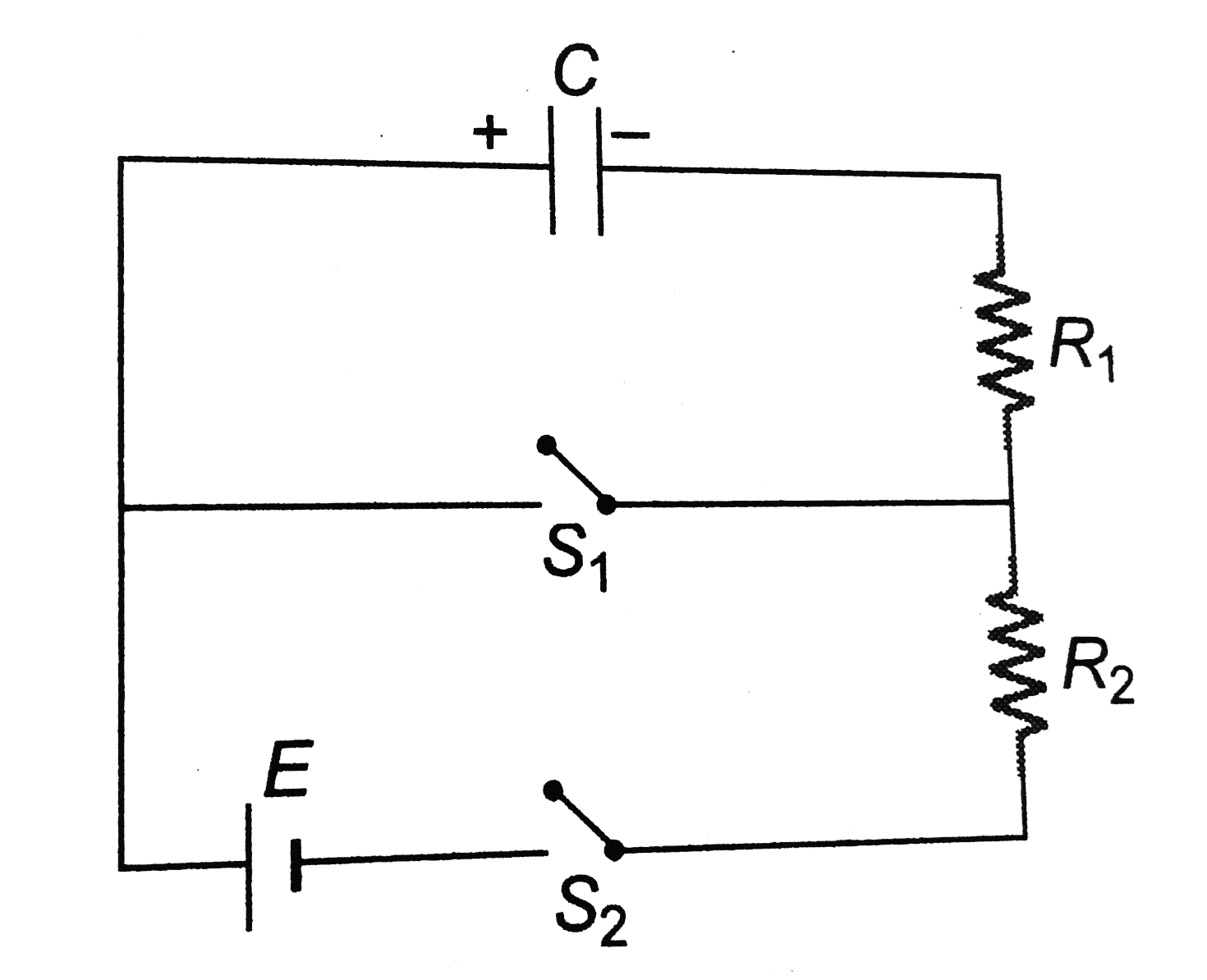 View Solution
View SolutionQuestion 46
The resistivity of cylindrical conductor carrying steady current along its length varies linearly with the distance from the current carrying end as given by ρ=ρ0(1+xl) where l is the length of the conductor and x is the distance from the current entry and. ρo is a positive constant. View SolutionQuestion 50
Passage-I :
A hollow cube of side L has two parallel sides conducting and remaining four sides are non conducting. It is filled with a liquid of dielectric constant K. A small hole of area A at bottom of cube is open at t = 0 and liquid starts leaking throught it. The two conducting sides are connected by a battery of emf E (L=9mA=18√20m2k=10E=81v,g=10m/sec)
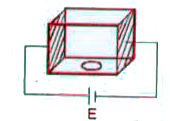
Capacitance of capacitor as a function of time View SolutionQuestion 51
Passage-I :
A hollow cube of side L has two parallel sides conducting and remaining four sides are non conducting. It is filled with a liquid of dielectric constant K. A small hole of area A at bottom of cube is open at t = 0 and liquid starts leaking throught it. The two conducting sides are connected by a battery of emf E (L=9mA=18√20m2k=10E=81v,g=10m/sec)

Capacitance of capacitor as a function of time View SolutionQuestion 52
Passage-I :
A hollow cube of side L has two parallel sides conducting and remaining four sides are non conducting. It is filled with a liquid of dielectric constant K. A small hole of area A at bottom of cube is open at t = 0 and liquid starts leaking throught it. The two conducting sides are connected by a battery of emf E (L=9mA=18√20m2k=10E=81v,g=10m/sec)
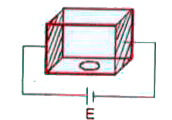
Current through the connecting wire of a time is given by View SolutionQuestion 53
Passage - II :
Consider a potentiometer arrangement having auniform wire AB of resistance 99Ω
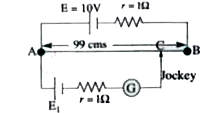
A driving battery of 10V emf and 1Ω internal resistance is used in the potentiometer. A cell of unknown emf E1 and internal resistance of 1Ω is balanced agains AC length of potentiometer wire.
When jockey is touched with wire AB at point C such that AC = 40 cm, there is no deflection in galvanometer. The emf of cell is View SolutionQuestion 54
Passage - II :
Consider a potentiometer arrangement having auniform wire AB of resistance 99Ω

A driving battery of 10V emf and 1Ω internal resistance is used in the potentiometer. A cell of unknown emf E1 and internal resistance of 1Ω is balanced agains AC length of potentiometer wire.
When jockey is touched with wire AB at point C such that AC = 40 cm, there is no deflection in galvanometer. The emf of cell is View SolutionQuestion 55
Passage - II :
Consider a potentiometer arrangement having auniform wire AB of resistance 99Ω

A driving battery of 10V emf and 1Ω internal resistance is used in the potentiometer. A cell of unknown emf E1 and internal resistance of 1Ω is balanced agains AC length of potentiometer wire.
When jockey is touched with wire AB at point C such that AC = 40 cm, there is no deflection in galvanometer. The emf of cell is View Solution
All Exercises from AAKASH SERIES Class 12 PHYSICS CURRENT ELECTRICITY
- EXERCISE - IA
- EXERCISE - IB
- LECTURE SHEET (EXERCISE- II LEVEL- II (ADVANCED) (LINKED COMPREHENSION TYPE QUESTIONS))
- LECTURE SHEET (EXERCISE- II LEVEL- II (ADVANCED) (MATRIX MATCHING TYPE QUESTIONS))
- LECTURE SHEET (EXERCISE- II LEVEL- II (ADVANCED) (STRAIGHT OBJECTIVE TYPE QUESTIONS))
- LECTURE SHEET (EXERCISE- II LEVEL-I (MAIN) (STRAIGHT OBJECTIVE TYPE QUESTIONS))
- LECTURE SHEET (EXERCISE-I LEVEL- II (ADVANCED) (MORE THAN ONE CORRECT ANSWER TYPE QUESTIONS))
- LECTURE SHEET (EXERCISE-I LEVEL- II (ADVANCED) (STRAIGHT OBJECTIVE TYPE QUESTIONS))
- LECTURE SHEET (EXERCISE-I LEVEL-1(MAIN) (STRAIGHT OBJECTIVE TYPE QUESTIONS))
- LECTURE SHEET (EXERCISE-III LEVEL- I (MAIN) (STRAIGHT OBJECTIVE TYPE QUESTIONS))
- LECTURE SHEET (EXERCISE-III LEVEL- II (ADVANCED) (LINKED COMPREHENSION TYPE QUESTIONS)
- LECTURE SHEET (EXERCISE-III LEVEL- II (ADVANCED) (MATRIX MATCHING TYPE QUESTIONS)
- LECTURE SHEET (EXERCISE-III LEVEL- II (ADVANCED) (STRAIGHT OBJECTIVE TYPE QUESTIONS))
- LECTURE SHEET (EXERCISE-IV LEVEL - I (MAIN) (STRAIGHT OBJECTIVE TYPE QUESTIONS))
- LECTURE SHEET (EXERCISE-IV LEVEL- II (ADVANCED) (INTEGER TYPE QUESTIONS))
- LECTURE SHEET (EXERCISE-IV LEVEL- II (ADVANCED) (LINKED COMPREHENSION TYPE QUESTIONS))
- LECTURE SHEET (EXERCISE-IV LEVEL- II (ADVANCED) (STRAIGHT OBJECTIVE TYPE QUESTIONS))
- LECTURE SHEET (EXERCISE-V LEVEL - I (MAIN) (STRAIGHT OBJECTIVE TYPE QUESTIONS))
- LECTURE SHEET (EXERCISE-V LEVEL-II (ADVANCED) (STRAIGHT OBJECTIVE TYPE QUESTIONS))
- LECTURE SHEET (EXERCISE-VI LEVEL - I (MAIN) (STRAIGHT OBJECTIVE TYPE QUESTIONS))
- LECTURE SHEET (EXERCISE-VI LEVEL- II (ADVANCED) (MATRIX MATCHING TYPE QUESTIONS))
- LECTURE SHEET (EXERCISE-VI LEVEL- II (ADVANCED) (STRAIGHT OBJECTIVE TYPE QUESTIONS))
- LECTURE SHEET (EXERCISE-VII LEVEL - I (MAIN) (STRAIGHT OBJECTIVE TYPE QUESTIONS))
- LECTURE SHEET (EXERCISE-VII LEVEL-II (ADVANCED) (LINKED COMPREHENSION TYPE QUESTIONS))
- LECTURE SHEET (EXERCISE-VII LEVEL-II (ADVANCED) (STRAIGHT OBJECTIVE TYPE QUESTIONS))
- EXERCISE - IA
- EXERCISE - IB
- LECTURE SHEET (EXERCISE- II LEVEL- II (ADVANCED) (LINKED COMPREHENSION TYPE QUESTIONS))
- LECTURE SHEET (EXERCISE- II LEVEL- II (ADVANCED) (MATRIX MATCHING TYPE QUESTIONS))
- LECTURE SHEET (EXERCISE- II LEVEL- II (ADVANCED) (STRAIGHT OBJECTIVE TYPE QUESTIONS))
- LECTURE SHEET (EXERCISE- II LEVEL-I (MAIN) (STRAIGHT OBJECTIVE TYPE QUESTIONS))
- LECTURE SHEET (EXERCISE-I LEVEL- II (ADVANCED) (MORE THAN ONE CORRECT ANSWER TYPE QUESTIONS))
- LECTURE SHEET (EXERCISE-I LEVEL- II (ADVANCED) (STRAIGHT OBJECTIVE TYPE QUESTIONS))
- LECTURE SHEET (EXERCISE-I LEVEL-1(MAIN) (STRAIGHT OBJECTIVE TYPE QUESTIONS))
- LECTURE SHEET (EXERCISE-III LEVEL- I (MAIN) (STRAIGHT OBJECTIVE TYPE QUESTIONS))
- LECTURE SHEET (EXERCISE-III LEVEL- II (ADVANCED) (LINKED COMPREHENSION TYPE QUESTIONS)
- LECTURE SHEET (EXERCISE-III LEVEL- II (ADVANCED) (MATRIX MATCHING TYPE QUESTIONS)
- LECTURE SHEET (EXERCISE-III LEVEL- II (ADVANCED) (STRAIGHT OBJECTIVE TYPE QUESTIONS))
- LECTURE SHEET (EXERCISE-IV LEVEL - I (MAIN) (STRAIGHT OBJECTIVE TYPE QUESTIONS))
- LECTURE SHEET (EXERCISE-IV LEVEL- II (ADVANCED) (INTEGER TYPE QUESTIONS))
- LECTURE SHEET (EXERCISE-IV LEVEL- II (ADVANCED) (LINKED COMPREHENSION TYPE QUESTIONS))
- LECTURE SHEET (EXERCISE-IV LEVEL- II (ADVANCED) (STRAIGHT OBJECTIVE TYPE QUESTIONS))
- LECTURE SHEET (EXERCISE-V LEVEL - I (MAIN) (STRAIGHT OBJECTIVE TYPE QUESTIONS))
- LECTURE SHEET (EXERCISE-V LEVEL-II (ADVANCED) (STRAIGHT OBJECTIVE TYPE QUESTIONS))
- LECTURE SHEET (EXERCISE-VI LEVEL - I (MAIN) (STRAIGHT OBJECTIVE TYPE QUESTIONS))
- LECTURE SHEET (EXERCISE-VI LEVEL- II (ADVANCED) (MATRIX MATCHING TYPE QUESTIONS))
- LECTURE SHEET (EXERCISE-VI LEVEL- II (ADVANCED) (STRAIGHT OBJECTIVE TYPE QUESTIONS))
- LECTURE SHEET (EXERCISE-VII LEVEL - I (MAIN) (STRAIGHT OBJECTIVE TYPE QUESTIONS))
- LECTURE SHEET (EXERCISE-VII LEVEL-II (ADVANCED) (LINKED COMPREHENSION TYPE QUESTIONS))
- LECTURE SHEET (EXERCISE-VII LEVEL-II (ADVANCED) (STRAIGHT OBJECTIVE TYPE QUESTIONS))
- EXERCISE - IA
- EXERCISE - IB
- LECTURE SHEET (EXERCISE- II LEVEL- II (ADVANCED) (LINKED COMPREHENSION TYPE QUESTIONS))
- LECTURE SHEET (EXERCISE- II LEVEL- II (ADVANCED) (MATRIX MATCHING TYPE QUESTIONS))
- LECTURE SHEET (EXERCISE- II LEVEL- II (ADVANCED) (STRAIGHT OBJECTIVE TYPE QUESTIONS))
- LECTURE SHEET (EXERCISE- II LEVEL-I (MAIN) (STRAIGHT OBJECTIVE TYPE QUESTIONS))
- LECTURE SHEET (EXERCISE-I LEVEL- II (ADVANCED) (MORE THAN ONE CORRECT ANSWER TYPE QUESTIONS))
- LECTURE SHEET (EXERCISE-I LEVEL- II (ADVANCED) (STRAIGHT OBJECTIVE TYPE QUESTIONS))
- LECTURE SHEET (EXERCISE-I LEVEL-1(MAIN) (STRAIGHT OBJECTIVE TYPE QUESTIONS))
- LECTURE SHEET (EXERCISE-III LEVEL- I (MAIN) (STRAIGHT OBJECTIVE TYPE QUESTIONS))
- LECTURE SHEET (EXERCISE-III LEVEL- II (ADVANCED) (LINKED COMPREHENSION TYPE QUESTIONS)
- LECTURE SHEET (EXERCISE-III LEVEL- II (ADVANCED) (MATRIX MATCHING TYPE QUESTIONS)
- LECTURE SHEET (EXERCISE-III LEVEL- II (ADVANCED) (STRAIGHT OBJECTIVE TYPE QUESTIONS))
- LECTURE SHEET (EXERCISE-IV LEVEL - I (MAIN) (STRAIGHT OBJECTIVE TYPE QUESTIONS))
- LECTURE SHEET (EXERCISE-IV LEVEL- II (ADVANCED) (INTEGER TYPE QUESTIONS))
- LECTURE SHEET (EXERCISE-IV LEVEL- II (ADVANCED) (LINKED COMPREHENSION TYPE QUESTIONS))
- LECTURE SHEET (EXERCISE-IV LEVEL- II (ADVANCED) (STRAIGHT OBJECTIVE TYPE QUESTIONS))
- LECTURE SHEET (EXERCISE-V LEVEL - I (MAIN) (STRAIGHT OBJECTIVE TYPE QUESTIONS))
- LECTURE SHEET (EXERCISE-V LEVEL-II (ADVANCED) (STRAIGHT OBJECTIVE TYPE QUESTIONS))
- LECTURE SHEET (EXERCISE-VI LEVEL - I (MAIN) (STRAIGHT OBJECTIVE TYPE QUESTIONS))
- LECTURE SHEET (EXERCISE-VI LEVEL- II (ADVANCED) (MATRIX MATCHING TYPE QUESTIONS))
- LECTURE SHEET (EXERCISE-VI LEVEL- II (ADVANCED) (STRAIGHT OBJECTIVE TYPE QUESTIONS))
- LECTURE SHEET (EXERCISE-VII LEVEL - I (MAIN) (STRAIGHT OBJECTIVE TYPE QUESTIONS))
- LECTURE SHEET (EXERCISE-VII LEVEL-II (ADVANCED) (LINKED COMPREHENSION TYPE QUESTIONS))
- LECTURE SHEET (EXERCISE-VII LEVEL-II (ADVANCED) (STRAIGHT OBJECTIVE TYPE QUESTIONS))
- EXERCISE - IA
- EXERCISE - IB
- LECTURE SHEET (EXERCISE- II LEVEL- II (ADVANCED) (LINKED COMPREHENSION TYPE QUESTIONS))
- LECTURE SHEET (EXERCISE- II LEVEL- II (ADVANCED) (MATRIX MATCHING TYPE QUESTIONS))
- LECTURE SHEET (EXERCISE- II LEVEL- II (ADVANCED) (STRAIGHT OBJECTIVE TYPE QUESTIONS))
- LECTURE SHEET (EXERCISE- II LEVEL-I (MAIN) (STRAIGHT OBJECTIVE TYPE QUESTIONS))
- LECTURE SHEET (EXERCISE-I LEVEL- II (ADVANCED) (MORE THAN ONE CORRECT ANSWER TYPE QUESTIONS))
- LECTURE SHEET (EXERCISE-I LEVEL- II (ADVANCED) (STRAIGHT OBJECTIVE TYPE QUESTIONS))
- LECTURE SHEET (EXERCISE-I LEVEL-1(MAIN) (STRAIGHT OBJECTIVE TYPE QUESTIONS))
- LECTURE SHEET (EXERCISE-III LEVEL- I (MAIN) (STRAIGHT OBJECTIVE TYPE QUESTIONS))
- LECTURE SHEET (EXERCISE-III LEVEL- II (ADVANCED) (LINKED COMPREHENSION TYPE QUESTIONS)
- LECTURE SHEET (EXERCISE-III LEVEL- II (ADVANCED) (MATRIX MATCHING TYPE QUESTIONS)
- LECTURE SHEET (EXERCISE-III LEVEL- II (ADVANCED) (STRAIGHT OBJECTIVE TYPE QUESTIONS))
- LECTURE SHEET (EXERCISE-IV LEVEL - I (MAIN) (STRAIGHT OBJECTIVE TYPE QUESTIONS))
- LECTURE SHEET (EXERCISE-IV LEVEL- II (ADVANCED) (INTEGER TYPE QUESTIONS))
- LECTURE SHEET (EXERCISE-IV LEVEL- II (ADVANCED) (LINKED COMPREHENSION TYPE QUESTIONS))
- LECTURE SHEET (EXERCISE-IV LEVEL- II (ADVANCED) (STRAIGHT OBJECTIVE TYPE QUESTIONS))
- LECTURE SHEET (EXERCISE-V LEVEL - I (MAIN) (STRAIGHT OBJECTIVE TYPE QUESTIONS))
- LECTURE SHEET (EXERCISE-V LEVEL-II (ADVANCED) (STRAIGHT OBJECTIVE TYPE QUESTIONS))
- LECTURE SHEET (EXERCISE-VI LEVEL - I (MAIN) (STRAIGHT OBJECTIVE TYPE QUESTIONS))
- LECTURE SHEET (EXERCISE-VI LEVEL- II (ADVANCED) (MATRIX MATCHING TYPE QUESTIONS))
- LECTURE SHEET (EXERCISE-VI LEVEL- II (ADVANCED) (STRAIGHT OBJECTIVE TYPE QUESTIONS))
- LECTURE SHEET (EXERCISE-VII LEVEL - I (MAIN) (STRAIGHT OBJECTIVE TYPE QUESTIONS))
- LECTURE SHEET (EXERCISE-VII LEVEL-II (ADVANCED) (LINKED COMPREHENSION TYPE QUESTIONS))
- LECTURE SHEET (EXERCISE-VII LEVEL-II (ADVANCED) (STRAIGHT OBJECTIVE TYPE QUESTIONS))
- EXERCISE - II
- PRACTICE SHEET (EXERCISE - I LEVEL-I (MAIN) (STRAIGHT OBJECTIVE TYPE QUESTIONS))
- PRACTICE SHEET (EXERCISE - I LEVEL-II (ADVANCED) (INTEGER TYPE QUESTIONS))
- PRACTICE SHEET (EXERCISE - I LEVEL-II (ADVANCED) (LINKED COMPREHENSION TYPE QUESTIONS))
- PRACTICE SHEET (EXERCISE - I LEVEL-II (ADVANCED) (MATRIX MATCHING TYPE QUESTIONS))
- PRACTICE SHEET (EXERCISE - I LEVEL-II (ADVANCED) (MORE THAN ONE CORRECT ANSWER TYPE QUESTIONS))
- PRACTICE SHEET (EXERCISE - I LEVEL-II (ADVANCED) (STRAIGHT OBJECTIVE TYPE QUESTIONS))
- PRACTICE SHEET (EXERCISE - II LEVEL-I (MAIN) (STRAIGHT OBJECTIVE TYPE QUESTIONS))
- PRACTICE SHEET (EXERCISE - II LEVEL-II (ADVANCED) (INTEGER TYPE QUESTIONS))
- PRACTICE SHEET (EXERCISE - II LEVEL-II (ADVANCED) (MATRIX MATCHING TYPE QUESTIONS))
- PRACTICE SHEET (EXERCISE - II LEVEL-II (ADVANCED) (MORE THAN ONE CORRECT ANSWER TYPE QUESTIONS))
- PRACTICE SHEET (EXERCISE - III LEVEL-I (MAIN) (STRAIGHT OBJECTIVE TYPE QUESTIONS))
- PRACTICE SHEET (EXERCISE - III LEVEL-II (ADVANCED) (INTEGER TYPE QUESTIONS))
- PRACTICE SHEET (EXERCISE - III LEVEL-II (ADVANCED) (LINKED COMPREHENSION TYPE QUESTIONS))
- PRACTICE SHEET (EXERCISE - III LEVEL-II (ADVANCED) (MATCHING TYPE QUESTIONS))
- PRACTICE SHEET (EXERCISE - III LEVEL-II (ADVANCED) (MORE THAN ONE CORRECT ANSWER TYPE QUESTIONS))
- PRACTICE SHEET (EXERCISE - IV LEVEL-I (MAIN) (STRAIGHT OBJECTIVE TYPE QUESTIONS))
- PRACTICE SHEET (EXERCISE - IV LEVEL-II (ADVANCED) (INTEGER TYPE QUESTIONS))
- PRACTICE SHEET (EXERCISE - IV LEVEL-II (ADVANCED) (LINKED COMPREHENSION TYPE QUESTIONS))
- PRACTICE SHEET (EXERCISE - IV LEVEL-II (ADVANCED) (MORE THAN ONE CORRECT ANSWER TYPE QUESTIONS))
- PRACTICE SHEET (EXERCISE - V LEVEL-I (MAIN) (STRAIGHT OBJECTIVE TYPE QUESTIONS))
- PRACTICE SHEET (EXERCISE - V LEVEL-II (ADVANCED) (INTEGER TYPE QUESTIONS))
- PRACTICE SHEET (EXERCISE - V LEVEL-II (ADVANCED) (MORE THAN ONE CORRECT ANSWER TYPE QUESTIONS))
- PRACTICE SHEET (EXERCISE - V LEVEL-II (ADVANCED) (STRAIGHT OBJECTIVE TYPE QUESTIONS))
- PRACTICE SHEET (EXERCISE - VI LEVEL-I (MAIN) (STRAIGHT OBJECTIVE TYPE QUESTIONS))
- PRACTICE SHEET (EXERCISE - VI LEVEL-II (ADVANCED) (LINKED COMPREHENSION TYPE QUESTIONS))
- PRACTICE SHEET (EXERCISE - VI LEVEL-II (ADVANCED) (MORE THAN ONE CORRECT TYPE QUESTIONS))
- PRACTICE SHEET (EXERCISE - VI LEVEL-II (ADVANCED) (STRAIGHT OBJECTIVE TYPE QUESTIONS))
- PRACTICE SHEET (EXERCISE - VII LEVEL-I (MAIN) (STRAIGHT OBJECTIVE TYPE QUESTIONS))
- PRACTICE SHEET (EXERCISE - VII LEVEL-II (ADVANCED) (INTEGER TYPE QUESTIONS))
- PRACTICE SHEET (EXERCISE - VII LEVEL-II (ADVANCED) (MATRIX MATCHING TYPE QUESTIONS))
- PRACTICE SHEET (EXERCISE - VII LEVEL-II (ADVANCED) (MORE THAN ONE CORRECT ANSWER TYPE QUESTIONS))
- PRACTICE SHEET (EXERCISE - VII LEVEL-II (ADVANCED) (STRAIGHT OBJECTIVE TYPE QUESTIONS))
- EXERCISE - II
- PRACTICE SHEET (EXERCISE - I LEVEL-I (MAIN) (STRAIGHT OBJECTIVE TYPE QUESTIONS))
- PRACTICE SHEET (EXERCISE - I LEVEL-II (ADVANCED) (INTEGER TYPE QUESTIONS))
- PRACTICE SHEET (EXERCISE - I LEVEL-II (ADVANCED) (LINKED COMPREHENSION TYPE QUESTIONS))
- PRACTICE SHEET (EXERCISE - I LEVEL-II (ADVANCED) (MATRIX MATCHING TYPE QUESTIONS))
- PRACTICE SHEET (EXERCISE - I LEVEL-II (ADVANCED) (MORE THAN ONE CORRECT ANSWER TYPE QUESTIONS))
- PRACTICE SHEET (EXERCISE - I LEVEL-II (ADVANCED) (STRAIGHT OBJECTIVE TYPE QUESTIONS))
- PRACTICE SHEET (EXERCISE - II LEVEL-I (MAIN) (STRAIGHT OBJECTIVE TYPE QUESTIONS))
- PRACTICE SHEET (EXERCISE - II LEVEL-II (ADVANCED) (INTEGER TYPE QUESTIONS))
- PRACTICE SHEET (EXERCISE - II LEVEL-II (ADVANCED) (MATRIX MATCHING TYPE QUESTIONS))
- PRACTICE SHEET (EXERCISE - II LEVEL-II (ADVANCED) (MORE THAN ONE CORRECT ANSWER TYPE QUESTIONS))
- PRACTICE SHEET (EXERCISE - III LEVEL-I (MAIN) (STRAIGHT OBJECTIVE TYPE QUESTIONS))
- PRACTICE SHEET (EXERCISE - III LEVEL-II (ADVANCED) (INTEGER TYPE QUESTIONS))
- PRACTICE SHEET (EXERCISE - III LEVEL-II (ADVANCED) (LINKED COMPREHENSION TYPE QUESTIONS))
- PRACTICE SHEET (EXERCISE - III LEVEL-II (ADVANCED) (MATCHING TYPE QUESTIONS))
- PRACTICE SHEET (EXERCISE - III LEVEL-II (ADVANCED) (MORE THAN ONE CORRECT ANSWER TYPE QUESTIONS))
- PRACTICE SHEET (EXERCISE - IV LEVEL-I (MAIN) (STRAIGHT OBJECTIVE TYPE QUESTIONS))
- PRACTICE SHEET (EXERCISE - IV LEVEL-II (ADVANCED) (INTEGER TYPE QUESTIONS))
- PRACTICE SHEET (EXERCISE - IV LEVEL-II (ADVANCED) (LINKED COMPREHENSION TYPE QUESTIONS))
- PRACTICE SHEET (EXERCISE - IV LEVEL-II (ADVANCED) (MORE THAN ONE CORRECT ANSWER TYPE QUESTIONS))
- PRACTICE SHEET (EXERCISE - V LEVEL-I (MAIN) (STRAIGHT OBJECTIVE TYPE QUESTIONS))
- PRACTICE SHEET (EXERCISE - V LEVEL-II (ADVANCED) (INTEGER TYPE QUESTIONS))
- PRACTICE SHEET (EXERCISE - V LEVEL-II (ADVANCED) (MORE THAN ONE CORRECT ANSWER TYPE QUESTIONS))
- PRACTICE SHEET (EXERCISE - V LEVEL-II (ADVANCED) (STRAIGHT OBJECTIVE TYPE QUESTIONS))
- PRACTICE SHEET (EXERCISE - VI LEVEL-I (MAIN) (STRAIGHT OBJECTIVE TYPE QUESTIONS))
- PRACTICE SHEET (EXERCISE - VI LEVEL-II (ADVANCED) (LINKED COMPREHENSION TYPE QUESTIONS))
- PRACTICE SHEET (EXERCISE - VI LEVEL-II (ADVANCED) (MORE THAN ONE CORRECT TYPE QUESTIONS))
- PRACTICE SHEET (EXERCISE - VI LEVEL-II (ADVANCED) (STRAIGHT OBJECTIVE TYPE QUESTIONS))
- PRACTICE SHEET (EXERCISE - VII LEVEL-I (MAIN) (STRAIGHT OBJECTIVE TYPE QUESTIONS))
- PRACTICE SHEET (EXERCISE - VII LEVEL-II (ADVANCED) (INTEGER TYPE QUESTIONS))
- PRACTICE SHEET (EXERCISE - VII LEVEL-II (ADVANCED) (MATRIX MATCHING TYPE QUESTIONS))
- PRACTICE SHEET (EXERCISE - VII LEVEL-II (ADVANCED) (MORE THAN ONE CORRECT ANSWER TYPE QUESTIONS))
- PRACTICE SHEET (EXERCISE - VII LEVEL-II (ADVANCED) (STRAIGHT OBJECTIVE TYPE QUESTIONS))
- EXERCISE - II
- PRACTICE SHEET (EXERCISE - I LEVEL-I (MAIN) (STRAIGHT OBJECTIVE TYPE QUESTIONS))
- PRACTICE SHEET (EXERCISE - I LEVEL-II (ADVANCED) (INTEGER TYPE QUESTIONS))
- PRACTICE SHEET (EXERCISE - I LEVEL-II (ADVANCED) (LINKED COMPREHENSION TYPE QUESTIONS))
- PRACTICE SHEET (EXERCISE - I LEVEL-II (ADVANCED) (MATRIX MATCHING TYPE QUESTIONS))
- PRACTICE SHEET (EXERCISE - I LEVEL-II (ADVANCED) (MORE THAN ONE CORRECT ANSWER TYPE QUESTIONS))
- PRACTICE SHEET (EXERCISE - I LEVEL-II (ADVANCED) (STRAIGHT OBJECTIVE TYPE QUESTIONS))
- PRACTICE SHEET (EXERCISE - II LEVEL-I (MAIN) (STRAIGHT OBJECTIVE TYPE QUESTIONS))
- PRACTICE SHEET (EXERCISE - II LEVEL-II (ADVANCED) (INTEGER TYPE QUESTIONS))
- PRACTICE SHEET (EXERCISE - II LEVEL-II (ADVANCED) (MATRIX MATCHING TYPE QUESTIONS))
- PRACTICE SHEET (EXERCISE - II LEVEL-II (ADVANCED) (MORE THAN ONE CORRECT ANSWER TYPE QUESTIONS))
- PRACTICE SHEET (EXERCISE - III LEVEL-I (MAIN) (STRAIGHT OBJECTIVE TYPE QUESTIONS))
- PRACTICE SHEET (EXERCISE - III LEVEL-II (ADVANCED) (INTEGER TYPE QUESTIONS))
- PRACTICE SHEET (EXERCISE - III LEVEL-II (ADVANCED) (LINKED COMPREHENSION TYPE QUESTIONS))
- PRACTICE SHEET (EXERCISE - III LEVEL-II (ADVANCED) (MATCHING TYPE QUESTIONS))
- PRACTICE SHEET (EXERCISE - III LEVEL-II (ADVANCED) (MORE THAN ONE CORRECT ANSWER TYPE QUESTIONS))
- PRACTICE SHEET (EXERCISE - IV LEVEL-I (MAIN) (STRAIGHT OBJECTIVE TYPE QUESTIONS))
- PRACTICE SHEET (EXERCISE - IV LEVEL-II (ADVANCED) (INTEGER TYPE QUESTIONS))
- PRACTICE SHEET (EXERCISE - IV LEVEL-II (ADVANCED) (LINKED COMPREHENSION TYPE QUESTIONS))
- PRACTICE SHEET (EXERCISE - IV LEVEL-II (ADVANCED) (MORE THAN ONE CORRECT ANSWER TYPE QUESTIONS))
- PRACTICE SHEET (EXERCISE - V LEVEL-I (MAIN) (STRAIGHT OBJECTIVE TYPE QUESTIONS))
- PRACTICE SHEET (EXERCISE - V LEVEL-II (ADVANCED) (INTEGER TYPE QUESTIONS))
- PRACTICE SHEET (EXERCISE - V LEVEL-II (ADVANCED) (MORE THAN ONE CORRECT ANSWER TYPE QUESTIONS))
- PRACTICE SHEET (EXERCISE - V LEVEL-II (ADVANCED) (STRAIGHT OBJECTIVE TYPE QUESTIONS))
- PRACTICE SHEET (EXERCISE - VI LEVEL-I (MAIN) (STRAIGHT OBJECTIVE TYPE QUESTIONS))
- PRACTICE SHEET (EXERCISE - VI LEVEL-II (ADVANCED) (LINKED COMPREHENSION TYPE QUESTIONS))
- PRACTICE SHEET (EXERCISE - VI LEVEL-II (ADVANCED) (MORE THAN ONE CORRECT TYPE QUESTIONS))
- PRACTICE SHEET (EXERCISE - VI LEVEL-II (ADVANCED) (STRAIGHT OBJECTIVE TYPE QUESTIONS))
- PRACTICE SHEET (EXERCISE - VII LEVEL-I (MAIN) (STRAIGHT OBJECTIVE TYPE QUESTIONS))
- PRACTICE SHEET (EXERCISE - VII LEVEL-II (ADVANCED) (INTEGER TYPE QUESTIONS))
- PRACTICE SHEET (EXERCISE - VII LEVEL-II (ADVANCED) (MATRIX MATCHING TYPE QUESTIONS))
- PRACTICE SHEET (EXERCISE - VII LEVEL-II (ADVANCED) (MORE THAN ONE CORRECT ANSWER TYPE QUESTIONS))
- PRACTICE SHEET (EXERCISE - VII LEVEL-II (ADVANCED) (STRAIGHT OBJECTIVE TYPE QUESTIONS))
- EXERCISE - II
- PRACTICE SHEET (EXERCISE - I LEVEL-I (MAIN) (STRAIGHT OBJECTIVE TYPE QUESTIONS))
- PRACTICE SHEET (EXERCISE - I LEVEL-II (ADVANCED) (INTEGER TYPE QUESTIONS))
- PRACTICE SHEET (EXERCISE - I LEVEL-II (ADVANCED) (LINKED COMPREHENSION TYPE QUESTIONS))
- PRACTICE SHEET (EXERCISE - I LEVEL-II (ADVANCED) (MATRIX MATCHING TYPE QUESTIONS))
- PRACTICE SHEET (EXERCISE - I LEVEL-II (ADVANCED) (MORE THAN ONE CORRECT ANSWER TYPE QUESTIONS))
- PRACTICE SHEET (EXERCISE - I LEVEL-II (ADVANCED) (STRAIGHT OBJECTIVE TYPE QUESTIONS))
- PRACTICE SHEET (EXERCISE - II LEVEL-I (MAIN) (STRAIGHT OBJECTIVE TYPE QUESTIONS))
- PRACTICE SHEET (EXERCISE - II LEVEL-II (ADVANCED) (INTEGER TYPE QUESTIONS))
- PRACTICE SHEET (EXERCISE - II LEVEL-II (ADVANCED) (MATRIX MATCHING TYPE QUESTIONS))
- PRACTICE SHEET (EXERCISE - II LEVEL-II (ADVANCED) (MORE THAN ONE CORRECT ANSWER TYPE QUESTIONS))
- PRACTICE SHEET (EXERCISE - III LEVEL-I (MAIN) (STRAIGHT OBJECTIVE TYPE QUESTIONS))
- PRACTICE SHEET (EXERCISE - III LEVEL-II (ADVANCED) (INTEGER TYPE QUESTIONS))
- PRACTICE SHEET (EXERCISE - III LEVEL-II (ADVANCED) (LINKED COMPREHENSION TYPE QUESTIONS))
- PRACTICE SHEET (EXERCISE - III LEVEL-II (ADVANCED) (MATCHING TYPE QUESTIONS))
- PRACTICE SHEET (EXERCISE - III LEVEL-II (ADVANCED) (MORE THAN ONE CORRECT ANSWER TYPE QUESTIONS))
- PRACTICE SHEET (EXERCISE - IV LEVEL-I (MAIN) (STRAIGHT OBJECTIVE TYPE QUESTIONS))
- PRACTICE SHEET (EXERCISE - IV LEVEL-II (ADVANCED) (INTEGER TYPE QUESTIONS))
- PRACTICE SHEET (EXERCISE - IV LEVEL-II (ADVANCED) (LINKED COMPREHENSION TYPE QUESTIONS))
- PRACTICE SHEET (EXERCISE - IV LEVEL-II (ADVANCED) (MORE THAN ONE CORRECT ANSWER TYPE QUESTIONS))
- PRACTICE SHEET (EXERCISE - V LEVEL-I (MAIN) (STRAIGHT OBJECTIVE TYPE QUESTIONS))
- PRACTICE SHEET (EXERCISE - V LEVEL-II (ADVANCED) (INTEGER TYPE QUESTIONS))
- PRACTICE SHEET (EXERCISE - V LEVEL-II (ADVANCED) (MORE THAN ONE CORRECT ANSWER TYPE QUESTIONS))
- PRACTICE SHEET (EXERCISE - V LEVEL-II (ADVANCED) (STRAIGHT OBJECTIVE TYPE QUESTIONS))
- PRACTICE SHEET (EXERCISE - VI LEVEL-I (MAIN) (STRAIGHT OBJECTIVE TYPE QUESTIONS))
- PRACTICE SHEET (EXERCISE - VI LEVEL-II (ADVANCED) (LINKED COMPREHENSION TYPE QUESTIONS))
- PRACTICE SHEET (EXERCISE - VI LEVEL-II (ADVANCED) (MORE THAN ONE CORRECT TYPE QUESTIONS))
- PRACTICE SHEET (EXERCISE - VI LEVEL-II (ADVANCED) (STRAIGHT OBJECTIVE TYPE QUESTIONS))
- PRACTICE SHEET (EXERCISE - VII LEVEL-I (MAIN) (STRAIGHT OBJECTIVE TYPE QUESTIONS))
- PRACTICE SHEET (EXERCISE - VII LEVEL-II (ADVANCED) (INTEGER TYPE QUESTIONS))
- PRACTICE SHEET (EXERCISE - VII LEVEL-II (ADVANCED) (MATRIX MATCHING TYPE QUESTIONS))
- PRACTICE SHEET (EXERCISE - VII LEVEL-II (ADVANCED) (MORE THAN ONE CORRECT ANSWER TYPE QUESTIONS))
- PRACTICE SHEET (EXERCISE - VII LEVEL-II (ADVANCED) (STRAIGHT OBJECTIVE TYPE QUESTIONS))
- ADDITIONAL PRACTICE EXERCISE (LEVEL -I(MAIN) (STRAIGHT OBJECTIVE TYPE QUESTIONS))
- ADDITIONAL PRACTICE EXERCISE (LEVEL -II LECTURE SHEET (ADVANCED) (INTEGER TYPE QUESTIONS))
- ADDITIONAL PRACTICE EXERCISE (LEVEL -II LECTURE SHEET (ADVANCED) (MATRIX MATCHING TYPE QUESTIONS))
- ADDITIONAL PRACTICE EXERCISE (LEVEL -II LECTURE SHEET (ADVANCED) (STRAIGHT OBJECTIVE TYPE QUESTIONS))
- ADDITIONAL PRACTICE EXERCISE (LEVEL -II PRACTICE SHEET (ADVANCED) (LINKED COMPREHENSION TYPE QUESTIONS))
- ADDITIONAL PRACTICE EXERCISE (LEVEL -II PRACTICE SHEET (ADVANCED) (MORE THAN ONE CORRECT ANSWER TYPE QUESTIONS))
- ADDITIONAL PRACTICE EXERCISE (LEVEL -II PRACTICE SHEET (ADVANCED) (STRAIGHT OBJECTIVE TYPE QUESTIONS))
- EXERCISE - III
- ADDITIONAL PRACTICE EXERCISE (LEVEL -I(MAIN) (STRAIGHT OBJECTIVE TYPE QUESTIONS))
- ADDITIONAL PRACTICE EXERCISE (LEVEL -II LECTURE SHEET (ADVANCED) (INTEGER TYPE QUESTIONS))
- ADDITIONAL PRACTICE EXERCISE (LEVEL -II LECTURE SHEET (ADVANCED) (MATRIX MATCHING TYPE QUESTIONS))
- ADDITIONAL PRACTICE EXERCISE (LEVEL -II LECTURE SHEET (ADVANCED) (STRAIGHT OBJECTIVE TYPE QUESTIONS))
- ADDITIONAL PRACTICE EXERCISE (LEVEL -II PRACTICE SHEET (ADVANCED) (LINKED COMPREHENSION TYPE QUESTIONS))
- ADDITIONAL PRACTICE EXERCISE (LEVEL -II PRACTICE SHEET (ADVANCED) (MORE THAN ONE CORRECT ANSWER TYPE QUESTIONS))
- ADDITIONAL PRACTICE EXERCISE (LEVEL -II PRACTICE SHEET (ADVANCED) (STRAIGHT OBJECTIVE TYPE QUESTIONS))
- EXERCISE - III
- ADDITIONAL PRACTICE EXERCISE (LEVEL -I(MAIN) (STRAIGHT OBJECTIVE TYPE QUESTIONS))
- ADDITIONAL PRACTICE EXERCISE (LEVEL -II LECTURE SHEET (ADVANCED) (INTEGER TYPE QUESTIONS))
- ADDITIONAL PRACTICE EXERCISE (LEVEL -II LECTURE SHEET (ADVANCED) (MATRIX MATCHING TYPE QUESTIONS))
- ADDITIONAL PRACTICE EXERCISE (LEVEL -II LECTURE SHEET (ADVANCED) (STRAIGHT OBJECTIVE TYPE QUESTIONS))
- ADDITIONAL PRACTICE EXERCISE (LEVEL -II PRACTICE SHEET (ADVANCED) (LINKED COMPREHENSION TYPE QUESTIONS))
- ADDITIONAL PRACTICE EXERCISE (LEVEL -II PRACTICE SHEET (ADVANCED) (MORE THAN ONE CORRECT ANSWER TYPE QUESTIONS))
- ADDITIONAL PRACTICE EXERCISE (LEVEL -II PRACTICE SHEET (ADVANCED) (STRAIGHT OBJECTIVE TYPE QUESTIONS))
- EXERCISE - III
- ADDITIONAL PRACTICE EXERCISE (LEVEL -I(MAIN) (STRAIGHT OBJECTIVE TYPE QUESTIONS))
- ADDITIONAL PRACTICE EXERCISE (LEVEL -II LECTURE SHEET (ADVANCED) (INTEGER TYPE QUESTIONS))
- ADDITIONAL PRACTICE EXERCISE (LEVEL -II LECTURE SHEET (ADVANCED) (MATRIX MATCHING TYPE QUESTIONS))
- ADDITIONAL PRACTICE EXERCISE (LEVEL -II LECTURE SHEET (ADVANCED) (STRAIGHT OBJECTIVE TYPE QUESTIONS))
- ADDITIONAL PRACTICE EXERCISE (LEVEL -II PRACTICE SHEET (ADVANCED) (LINKED COMPREHENSION TYPE QUESTIONS))
- ADDITIONAL PRACTICE EXERCISE (LEVEL -II PRACTICE SHEET (ADVANCED) (MORE THAN ONE CORRECT ANSWER TYPE QUESTIONS))
- ADDITIONAL PRACTICE EXERCISE (LEVEL -II PRACTICE SHEET (ADVANCED) (STRAIGHT OBJECTIVE TYPE QUESTIONS))
- EXERCISE - III
- PROBLEMS
- PROBLEMS
- PROBLEMS
- PROBLEMS

